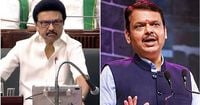On April 22, 2025, Maharashtra's language policy took a dramatic turn as the state government announced that Hindi will no longer be a mandatory third language in schools. This decision came in response to significant backlash from opposition parties and public outcry regarding the earlier mandate that required Hindi for students in Classes 1 to 5.
The controversy began when the Maharashtra government, led by Chief Minister Devendra Fadnavis, unveiled a plan on April 16 to implement the National Education Policy (NEP) 2020. This policy included making Hindi compulsory alongside Marathi and English for young students. However, the proposal faced immediate resistance from various political factions, including the Shiv Sena (UBT), Maharashtra Navnirman Sena (MNS), and the Nationalist Congress Party (NCP), who accused the government of imposing Hindi on the state's linguistic diversity.
In a press conference on April 22, State School Education Minister Dadaji Bhuse announced the reversal of the decision, stating that Hindi would now be an optional subject. He clarified that the term "mandatory" would be removed from the government resolution. Bhuse emphasized that the three-language formula would still be implemented, but with greater flexibility, allowing students to choose their preferred languages as long as two of them are native to India.
"The Centre has not mandated any language. The three-language formula will still apply, but there will be no need to study Hindi," Bhuse asserted, addressing concerns about cultural imposition and the importance of regional languages.
The earlier decision to make Hindi compulsory sparked widespread debate, with many arguing that it undermined the significance of Marathi in the state's educational framework. Critics pointed out that the move was not only a matter of language preference but also of cultural identity. The Language Consultation Committee, chaired by Laxmikant Deshmukh, had raised objections, citing procedural bypassing and the need for a more inclusive approach to language education.
Bhuse acknowledged the concerns and stated, "We will frame new rules after studying the schools, the number of students, and the teachers teaching there. However, the three-language formula will be implemented, and schools must accommodate other language choices." This reflects a commitment to promoting multilingualism while respecting the linguistic heritage of Maharashtra.
The reversal of the Hindi mandate has been welcomed by various stakeholders, including Congress leader Vijay Wadettiwar, who highlighted the importance of preserving the dignity of Marathi. Wadettiwar expressed relief that the government recognized the need to keep Hindi optional, aligning with the sentiments of many residents who felt that their linguistic rights were under threat.
In the wake of the announcement, political dynamics in Maharashtra have shifted, with various parties claiming credit for the government's decision. Raj Thackeray of the MNS asserted that the reversal was a direct result of his party's pressure on the government, indicating how language politics can influence broader political narratives.
The Maharashtra government had initially planned to roll out the NEP 2020 framework starting with Class 1 in the academic year 2025-26, expanding to all grades by 2028-29. However, the recent developments raise questions about how the implementation of this policy will proceed, especially in light of the strong public sentiment surrounding language education.
As the state navigates these complex linguistic waters, the implications of the language policy extend beyond the classroom. They touch on issues of identity, culture, and the relationship between regional and national languages. The government's decision to make Hindi optional is seen not just as an educational policy change, but as a reflection of Maharashtra's diverse cultural landscape.
Looking ahead, the Maharashtra government will need to ensure that the revised language policy is effectively communicated and implemented in schools. The focus will be on promoting a balanced approach to language education that respects the rights of all linguistic communities while fostering unity and understanding among students.
In summary, the language war in Maharashtra has highlighted the complexities of implementing national education policies in a linguistically diverse state. The decision to make Hindi optional rather than mandatory is a significant step towards acknowledging the cultural aspirations of the people of Maharashtra, ensuring that students are empowered to learn in a way that reflects their identities and heritage.






